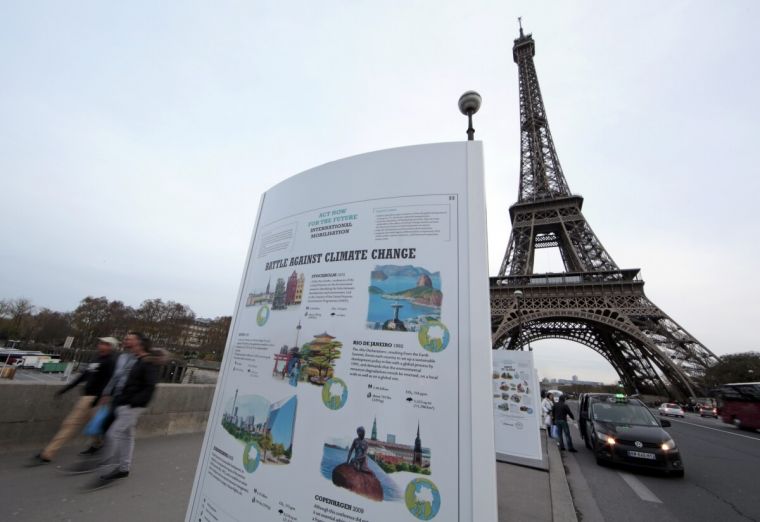Paris climate activists plan human chain on global day of action

Activists plan to join arms and form a "human chain" in Paris on Sunday to urge action on global warming, in a muted rally after attacks on the city by Islamic State, at the heart of worldwide protests on the eve of a UN climate summit in France.
More than 2,000 climate events are planned in cities including Sydney, Jakarta, Berlin, London, Sao Paulo and New York, making it one of the biggest days of action on climate change in history, organisers say.
Campaigners mobilised by Christian Aid, Tearfund, CAFOD and the Church of England marked the end of their 200-mile 'Pilgrimage2Paris' by joining faith leaders and pilgrims from across the world to deliver global petitions containing nearly 1.8 million signatures to the United Nations climate chief.
At the 'Faith in Climate Justice' event in Saint-Denis, northern Paris, a collection of faith-based petitions signed by 1,780,528 million people worldwide was delivered.
The petitions were received in person by the executive secretary of the UNFCCC (United Nations Frameworks for the Convention on Climate Change), Christiana Figueres and Special Envoy of the French President for the Protection of the Planet, Nicolas Hulot.
Ms Figueres was moved to tears by the occasion. She thanked the thousands of people who had walked, cycled and marched worldwide to express solidarity with communities hit by climate-related impacts and to urge leaders to seal a fair, ambitious and binding deal that curbs global warming and helps poor countries adapt to their changing climate.
She said: "I would like to thank you for your messages, for almost 2 million signatures, for your walking, for your praying, for your singing, for being who you are... There were people walking in every continent, making a total of 280,000km: that is the equivalent of having walked seven times around the world. I want to thank you for every single step, because with every step you have shown that it is possible to treat lightly in this our beautiful planet."
In France, activists plan to form a static human chain, formed by about 3,400 people joining arms along what had been the original 3km (1.9 miles) route through central Paris from the Place de la Republique to Place de la Nation.
"This is a moment for the whole world to join hands," said Iain Keith, campaign director for Avaaz, one of the organisers.
Separately, more than 10,000 demonstrators who had planned to come to Paris have instead sent shoes to form a big pile in a sign of solidarity. Organisers said the Vatican even sent a pair to represent Pope Francis.
Alix Mazounie of French Climate Action Network said the activists reckoned a human chain would not violate the state of emergency.
"This is not civil disobedience," she said. The chain would break, for instance, wherever it crossed a road to avoid disrupting traffic.
But, underscoring security worries, France put 24 green activists under house arrest before the summit, Interior Minister Bernard Cazeneuve said on Saturday, saying they were suspected of planning violent protests at the talks.
Still, Foreign Minister Laurent Fabius welcomed the worldwide demonstrations, which organizers say will include concerts, rallies, bicycle rides and a march by 1,000 Maasai in Tanzania urging more renewable energy.
"It is very positive," Fabius said, for governments to feel public pressure to act. Many environmental activists want a phase-out of fossil fuels and a shift to 100 percent renewable energies by 2050.
Some marches were held on Friday and Saturday, from Melbourne to Edinburgh. "Don't be a fossil fool," one Australian banner said.
In the biggest single march on climate change ever staged, last year organizers estimated 310,000 people took part in New York.
On Saturday, faith groups delivered a series of petitions signed by 1.8 million people urging stronger action, collected on pilgrimages to Paris. "The time for talking is long over," said Yeb Sano of the Philippines, who walked 1,500km from Rome.
Fina Dinkelt, 28, a Swiss health care worker at a march in Zurich on Saturday, said there was a risk marches did not appeal to enough people. "I think they just draw people who already think this way. That is a bit of a problem," she said.
Additional reporting by Reuters











